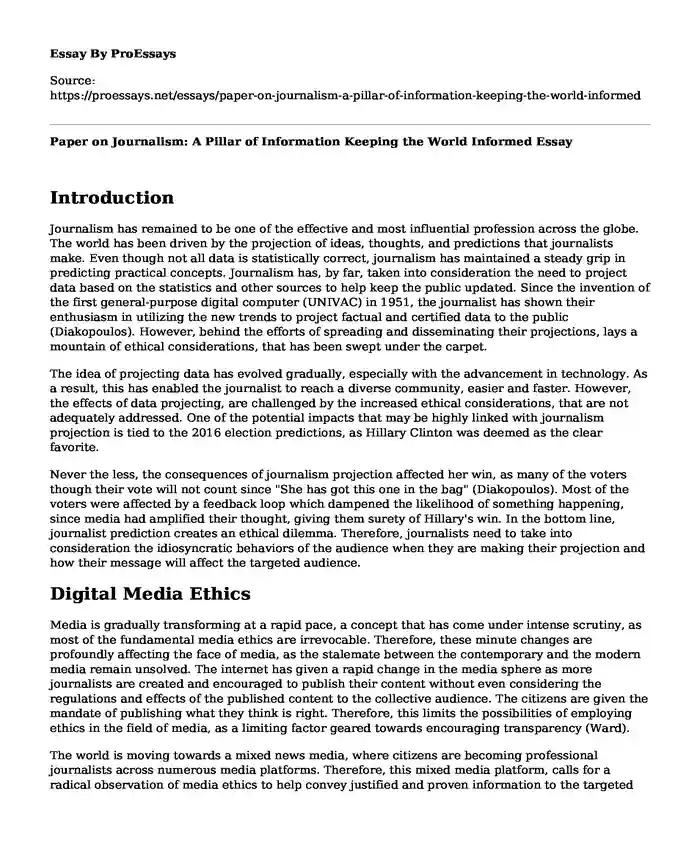Introduction
Journalism has remained to be one of the effective and most influential profession across the globe. The world has been driven by the projection of ideas, thoughts, and predictions that journalists make. Even though not all data is statistically correct, journalism has maintained a steady grip in predicting practical concepts. Journalism has, by far, taken into consideration the need to project data based on the statistics and other sources to help keep the public updated. Since the invention of the first general-purpose digital computer (UNIVAC) in 1951, the journalist has shown their enthusiasm in utilizing the new trends to project factual and certified data to the public (Diakopoulos). However, behind the efforts of spreading and disseminating their projections, lays a mountain of ethical considerations, that has been swept under the carpet.
The idea of projecting data has evolved gradually, especially with the advancement in technology. As a result, this has enabled the journalist to reach a diverse community, easier and faster. However, the effects of data projecting, are challenged by the increased ethical considerations, that are not adequately addressed. One of the potential impacts that may be highly linked with journalism projection is tied to the 2016 election predictions, as Hillary Clinton was deemed as the clear favorite.
Never the less, the consequences of journalism projection affected her win, as many of the voters though their vote will not count since "She has got this one in the bag" (Diakopoulos). Most of the voters were affected by a feedback loop which dampened the likelihood of something happening, since media had amplified their thought, giving them surety of Hillary's win. In the bottom line, journalist prediction creates an ethical dilemma. Therefore, journalists need to take into consideration the idiosyncratic behaviors of the audience when they are making their projection and how their message will affect the targeted audience.
Digital Media Ethics
Media is gradually transforming at a rapid pace, a concept that has come under intense scrutiny, as most of the fundamental media ethics are irrevocable. Therefore, these minute changes are profoundly affecting the face of media, as the stalemate between the contemporary and the modern media remain unsolved. The internet has given a rapid change in the media sphere as more journalists are created and encouraged to publish their content without even considering the regulations and effects of the published content to the collective audience. The citizens are given the mandate of publishing what they think is right. Therefore, this limits the possibilities of employing ethics in the field of media, as a limiting factor geared towards encouraging transparency (Ward).
The world is moving towards a mixed news media, where citizens are becoming professional journalists across numerous media platforms. Therefore, this mixed media platform, calls for a radical observation of media ethics to help convey justified and proven information to the targeted audience. As the increasing media platforms continue to spring, it is essential to reinvent ethics that cover the media of today and not yesterday. Ethical tension has sprung between tradition and online journalism. On the one hand, contemporary journalism clings on the accuracy, balance, pre-publication verification, and impartiality. On the other hand, online journalism has taken a different twist, which emphasizes immediacy, portability, and transparency. However, online journalism remains to be a non-professional occupation, since most of the activities and published content, is done under the nose of media ethics.
- How has Media ethics transformed the face of contemporary journalism?
- How is online journalism slowly adopting media ethical considerations?
- What considerations should be implemented to limit the violation of media ethics, as online journalism gains popularity?
Works Cited
Diakopoulos, Nicholas. "The Ethics Of Predictive Journalism." Diakopoulos Review, 2020, https://www.cjr.org/tow_center/predictive-journalism-artificial-intelligence-ethics.php
Ward, Stephen. "Digital Media Ethics." Center For Journalism Ethics, 2020, https://ethics.journalism.wisc.edu/resources/digital-media-ethics/
Cite this page
Paper on Journalism: A Pillar of Information Keeping the World Informed. (2023, Sep 21). Retrieved from https://proessays.net/essays/paper-on-journalism-a-pillar-of-information-keeping-the-world-informed
If you are the original author of this essay and no longer wish to have it published on the ProEssays website, please click below to request its removal:
- Movie: The Prestige
- The World of Gattaca: Genetic Perfection Essay
- Does Rap Music Promote Violence in High School? Essay
- Critical Essay on Rembrandt's Self-Portrait, Frida Kahlo's My Birth and A Subtlety, of the Marvelous Sugar Baby
- Designing User-Centred Prefabricated Family Houses in Denmark - Essay Sample
- Essay Example on Interior Design: Crafting Home Comfort & Aesthetics
- Music: Art of Meaningful Sounds, Universal & Essential - Research Paper Example







